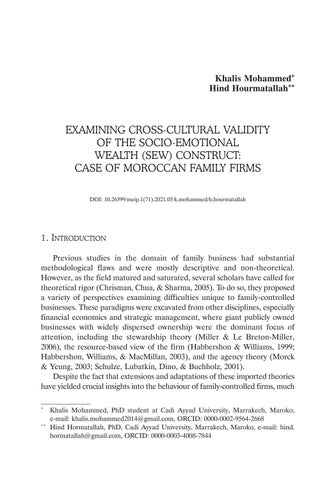Khalis Mohammed* Hind Hourmatallah**
EXAMINING CROSS-CULTURAL VALIDITY OF THE SOCIO-EMOTIONAL WEALTH (SEW) CONSTRUCT: CASE OF MOROCCAN FAMILY FIRMS DOI: 10.26399/meip.1(71).2021.05/k.mohammed/h.hourmatallah
1. INTRODUCTION Previous studies in the domain of family business had substantial methodological flaws and were mostly descriptive and non-theoretical. However, as the field matured and saturated, several scholars have called for theoretical rigor (Chrisman, Chua, & Sharma, 2005). To do so, they proposed a variety of perspectives examining difficulties unique to family-controlled businesses. These paradigms were excavated from other disciplines, especially financial economics and strategic management, where giant publicly owned businesses with widely dispersed ownership were the dominant focus of attention, including the stewardship theory (Miller & Le Breton-Miller, 2006), the resource-based view of the firm (Habbershon & Williams, 1999; Habbershon, Williams, & MacMillan, 2003), and the agency theory (Morck & Yeung, 2003; Schulze, Lubatkin, Dino, & Buchholz, 2001). Despite the fact that extensions and adaptations of these imported theories have yielded crucial insights into the behaviour of family-controlled firms, much * **
Khalis Mohammed, PhD student at Cadi Ayyad University, Marrakech, Maroko, e-mail: khalis.mohammed2014@gmail.com, ORCID: 0000-0002-9564-2668 Hind Hormatallah, PhD, Cadi Ayyad University, Marrakech, Maroko, e-mail: hind. hormatallah@gmail.com, ORCID: 0000-0003-4008-7844




